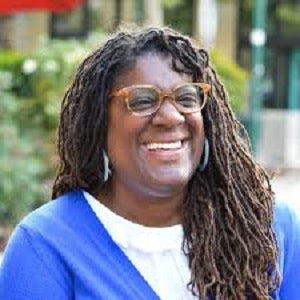As a teacher at a private high school in an affluent San Francisco Bay-area community and later as a dean at a high-needs public charter school in California, Vielka Hoy noticed wide differences between the two institutions in college-attainment rates and in where students decided to matriculate.
The disparities had less to do with academic ability than with perceptions about affordability, awareness of school options and how opportunities for access were structured, said Hoy.
 Vielka Hoy
Vielka HoyShe developed a passion for educational equity, which led her to establish a college preparation and success consultancy for underserved students in 2013. Now, she’s poised to take it a step further with the Bridge To College mobile app.
“I saw some things that could be translated to other schools and that could change a lot, so I started the consulting business,” said Hoy. “It worked really well. And I thought, ‘How can we scale that using technology, artificial intelligence and machine learning, what I was doing in person, so more folk had access to it?’”
The app was the answer for the UC Berkeley doctoral student, who is currently writing her dissertation on data science. It is designed to improve transparency, accessibility, affordability and graduation rates by using comprehensive survey methodology to match students with schools based on academic fit, financial capability and social compatibility.
Bridge To College can fill a void in college-selection advisement and help level the playing field for underrepresented students, Hoy said. Helping them identify a school that is a good academic fit, has significant financial resources available and graduates students at high rates can boost their persistence rates, which tend to be lower while their student loan debt often is higher, she noted.
In creating the tool, Hoy drew on her 20 years of experience as a middle school and high school teacher and a college instructor. Her academic background includes a bachelor’s degree in social studies education from New York University, a master’s degree in Afro-American Studies from UCLA and work as a program associate and specialist in educational technologies at Stanford University’s Graduate School of Education.
And schools that don’t have a graduation rate of 70 percent within six years and don’t fund a majority of the costs are excluded from a list of recommendation that the app will provide.
“We only recommend colleges that will fund students and graduate them on time,” said Hoy. “A lot of them are schools that students either have never heard of or didn’t realize they could get in. The majority of schools are not graduating their students. And some seem expensive because of the sticker price, but nobody actually pays that. Often, students are told the wrong thing in high school, that they can’t go to great college because they can’t afford it – but they actually could. It’s the same with being able to achieve in class. So we provide the right information to make the best decision.”
It’s a tool that could have helped her when she was considering undergraduate options in the Nineties, Hoy says.
“I could have seen more schools that would have been a possible fit,” she said. “I do wonder how much additional funding I could have received if I had this particular resource.”
As an Afro-Latina Brooklyn native and a first-generation college student – the daughter of Nicaraguan and Panamanian immigrants – Hoy is particularly interested in assisting underserved and underrepresented communities such as students of color and first-generation, immigrant and low-income students, as well as girls and public-schools students.
So far, through Vielka Hoy Consulting, she has matched more than 100 students with schools ranging from Duke to Pepperdine, she said.
The ongoing “varsity blues” national scandal highlights how advantages for the privileged act as barriers to those who already are underrepresented and lack the money or influence to even legally position themselves for acceptance at selective institutions.
“Parents trying to do it themselves are facing that huge machine,” said Hoy. “That’s why I’m providing the access and information, so people don’t have to pay for it. Even though it’s not always illegal, it’s unfair some of the many ways people with means access advantages that others can’t. So, any sort of leg-up that regular people can get is critical.”
The app will be compatible with IOS and Android devices and be available for free at app stores and Google, Hoy said, thanks in part to a crowdsourced funding effort underway.
Some public universities in California and private colleges are testing the app now, she said, and students interested in participating in a full pilot test can contact [email protected].
LaMont Jones can be reached at [email protected]. You can follow him on Twitter @DrLamontJones















